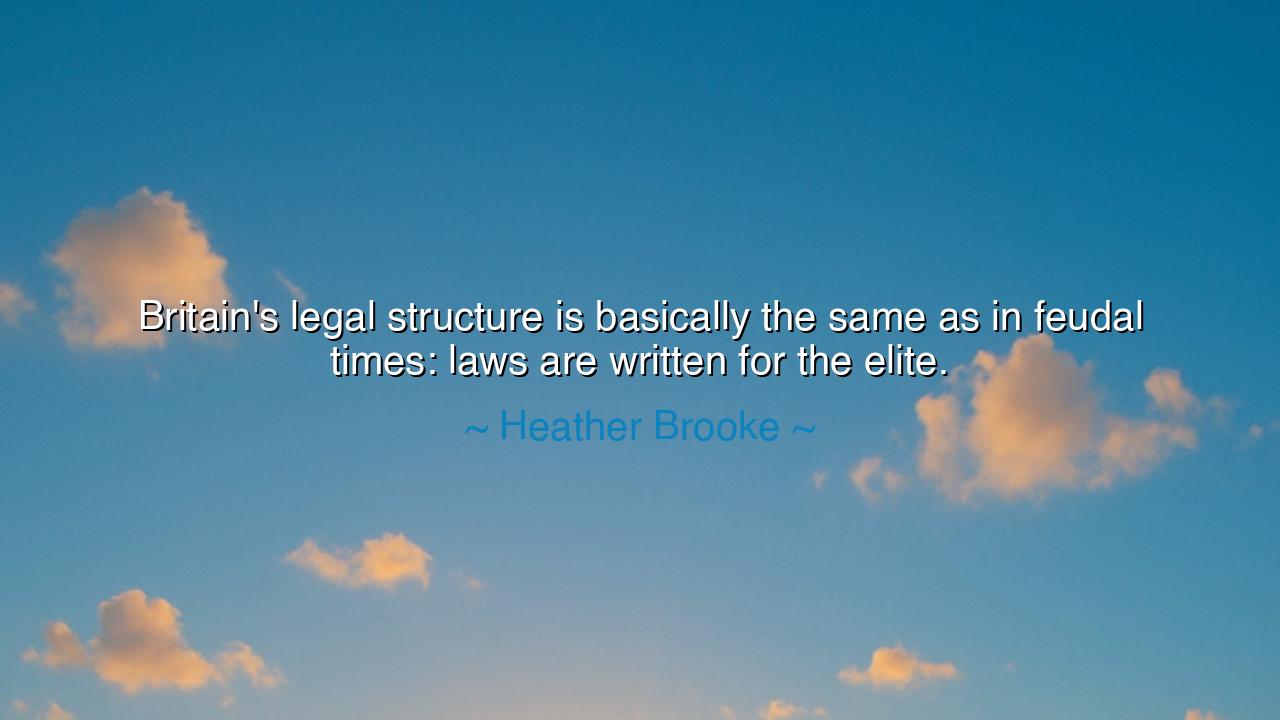
Britain's legal structure is basically the same as in feudal
Britain's legal structure is basically the same as in feudal times: laws are written for the elite.






Hear, O seekers of justice, the words of Heather Brooke: “Britain's legal structure is basically the same as in feudal times: laws are written for the elite.” These words strike like a hammer upon stone, breaking the illusion that time alone brings fairness. For though centuries have passed since the banners of feudal lords flew over castles, the shadow of their dominion lingers still in the foundations of law. Where once serfs bowed to barons, now citizens bend beneath structures that favor the wealthy and the powerful. The names have changed, but the spirit of inequality has not yet departed.
The ancients knew well that law is not neutral. It can be a sword of tyranny or a shield of justice, depending on who wields the pen. When Brooke declares that the legal structure remains rooted in feudal times, she reveals that systems built in ages of hierarchy often endure beneath the surface, shaping the destinies of the many for the benefit of the few. For law was often born not to protect the people, but to secure the rights of lords, landowners, and monarchs. Even as democracy has risen, these roots remain entangled, binding the present with the injustices of the past.
Consider the story of the Enclosure Acts in England. For centuries, common land was open to all, sustaining peasants with grazing and harvest. But through laws passed by Parliament—laws written by the wealthy landowners themselves—these commons were seized, enclosed, and privatized. The poor lost their livelihoods, and the rich grew richer. Though the serfdom of feudal days had ended, the spirit of feudalism remained alive in the law. Here is Brooke’s truth in flesh: the law has too often been the servant of the elite, guarding their privileges while stripping the poor of dignity.
Think also of the Magna Carta, hailed as a cornerstone of liberty. Yet when first written, it was not for the people, but for the barons, who sought to limit the king for their own advantage. Only in later centuries was it reinterpreted as a charter of freedom for all. Thus history shows us that even sacred texts of law, celebrated as milestones of justice, were born in service to the few before they became a promise to the many. The origin of Brooke’s lament is found in this legacy: that the people have long received justice not as birthright, but as something wrested from the grip of power.
Yet let us not despair, for history also teaches that laws may be reclaimed. The struggles of the Chartists, the suffragettes, and the labor movements testify that the law, though written for the elite, can be reshaped by the courage of the common people. When men and women rose to demand the vote, when workers demanded protection, when voices of dissent cried out against secrecy and privilege, the law was forced to bend toward greater justice. The pen that once served only the lords can, through struggle, be seized by the people.
The lesson is clear: never trust that time alone will heal injustice. Laws do not grow just by accident; they are made just by vigilance and struggle. If you live under a system that favors the powerful, do not accept it as natural. Question, resist, demand transparency. Support leaders who strip away privilege, who write not for the few but for the many. For the law must be not a fortress for the elite, but a foundation for all.
Practical action lies before you: learn the laws that govern you, and ask whom they truly serve. Demand reforms that protect the vulnerable, not merely the privileged. Support the free press, whistleblowers, and truth-tellers who, like Brooke herself, expose the hidden continuities of feudal power. And remember always that silence is complicity: to ignore injustice in the law is to allow its chains to endure.
So let it be remembered: the legal structure may still bear the marks of feudal times, but the people are not powerless. The walls of privilege may stand for centuries, yet they crumble when challenged by courage, unity, and truth. Laws were once written for the elite; let them now be written for the people. And may each generation take up the sacred duty to ensure that justice is not the privilege of the few, but the birthright of all.






AAdministratorAdministrator
Welcome, honored guests. Please leave a comment, we will respond soon